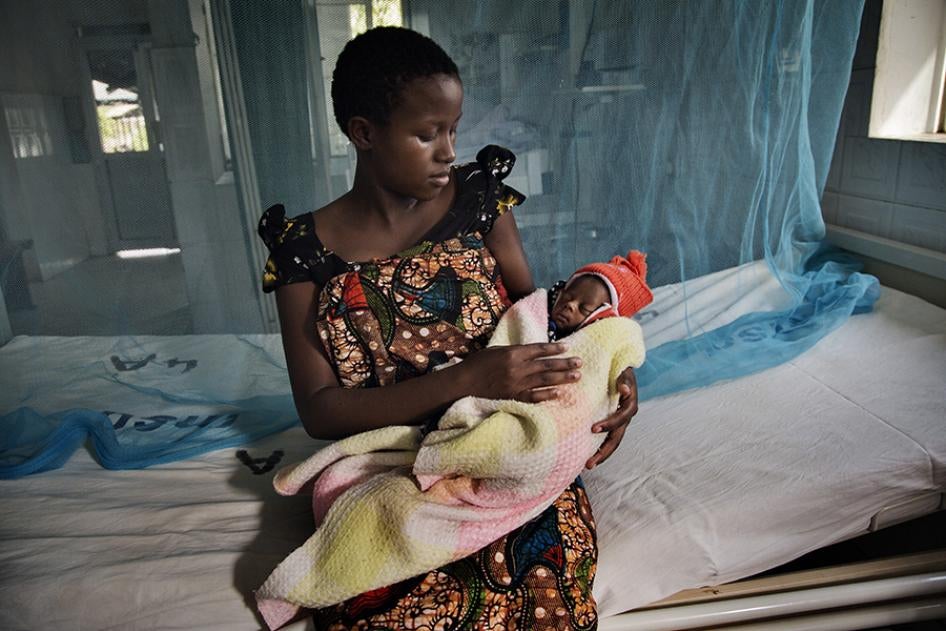Thousands of girls who are adolescent mothers in Tanzania now have the option to study in public secondary schools, thanks to the government reversing its position and allowing adolescent mothers to return to their studies.
For decades, pregnant students and adolescent mothers have been forced to drop out of school. In 2017 Tanzania adopted a discriminatory ban that prohibited them from continuing their education in public schools and threatened to deregister nongovernmental organizations that challenged the ban.
On November 24, 2021, then-Education Minister Joyce Ndalichako announced that girls who had dropped out of school because of pregnancy could return to school, effective immediately. This change allows girls to re-enroll within two years of giving birth, or, if later than two years, they can enroll at an alternative education center that offers a condensed version of the curriculum.
The Tanzanian government has also pledged to adopt additional measures. By June, it has agreed to publish new guidelines to provide more details on how long pregnant students can stay in school, how much time they will be allowed to be absent from school after giving birth, and the type of support they will receive when they return.
The government has also said that it will prohibit involuntary pregnancy testing.
Human Rights Watch has documented the impact that a lack of support from the schools has had on girls. Esther A., 21, from a village near Kilimanjaro, was expelled from Form 2 in 2017:
My mom tried to beg [school officials] whether I could return to school after I have given birth. But they told her no, I couldn’t go back to school. They said they can’t have a mother in the classroom, and that I’ll be a bad influence on other students.
In the Arusha region, Maria T., 21, was expelled from her private school in 2015, when she was in Form 2:
There were two of us who were found to be pregnant. The teachers simply told us that we won’t be able to continue with studies because [of] the government policy … After that, they gave me a letter to take to my parents and that was the end of my studies.
Tanzania’s Education Act allows for students to be expelled if they are married or if they commit “an offense against morality.” Although not explicitly stated, school officials have very often quoted this provision to expel school students who are pregnant or are mothers.
The government should now change this law to ensure girls are protected from these arbitrary decisions.
Human rights organizations, including Human Rights Watch, have long advocated against this discriminatory ban. A 2017 Human Rights Watch report documented many instances in which school officials conducted mandatory pregnancy tests in schools, and expelled students who tested positive. Human Rights Watch made numerous appeals to the World Bank to withhold a loan funding education in Tanzania until the country removed its discriminatory policy and guaranteed equal access to education. The World Bank approved the loan, amid widespread criticism from Tanzanian activists and many organizations, including Human Rights Watch.
Last October we published new evidence that showed how the school ban harms girls, and how the government’s World Bank-funded program establishing alternative education centers did not guarantee an equal education. The government’s updated agreement with the World Bank responds to many of Human Rights Watch’s concerns and recommendations to ensure the government adopts rights-compliant measures that increase protections for girls’ education.
Tanzania’s officials announced the ban’s reversal only a month after the release of this latest report.
The Tanzanian government should set out clear guidance for schools and government officials to ensure that these girls can return to school. Also, it should create laws and policies that protect girls who are pregnant or mothers. The government should also ensure that pregnant students and adolescent mothers have the support they need – including access to childcare – to finish school.
Across the African Union, at least 30 countries now have laws, policies, or strategies to protect pregnant students’ and adolescent mothers’ right to education. Human Rights Watch will continue to advocate that girls who are pregnant, already mothers, or married, stay in or are welcomed back to school.
These changes show encouraging steps for girls’ education in Tanzania. But more needs to be done to ensure all schools protect girls’ right to education.










